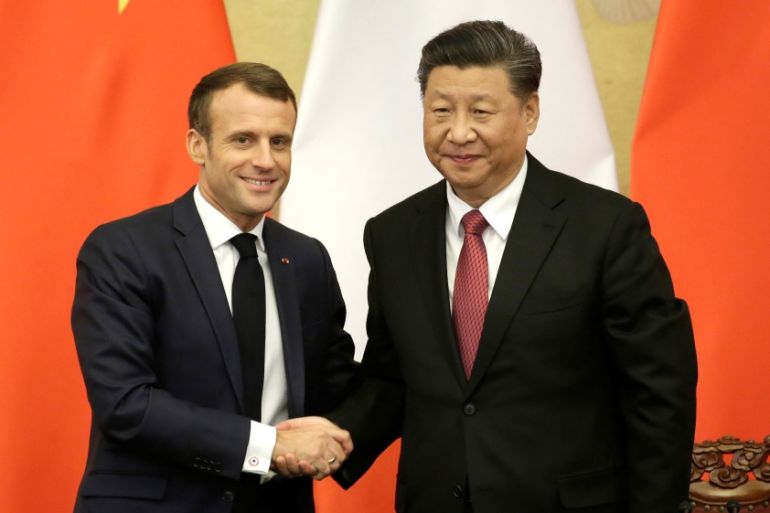Planes, poultry, power: China, France agree $15bn worth of deals
The energy, agriculture and aviation sectors are included in the deals, which will enable more French exports to China.

China might be in the midst of an economy-sapping trade war with the United States, but its relations with France appear to be blossoming.
The two countries signed contracts totalling $15bn during a visit by French President Emmanuel Macron, a Chinese government official said at a news briefing on Wednesday.
Keep reading
list of 3 itemsUS tells UN it is pulling out of Paris climate deal
Scientists: Nations need stronger pledges to curb climate change
Deals were struck in the fields of aeronautics, energy and agriculture, including approval for 20 French companies to export poultry, beef and pork to China, as well as a pledge by China to support purchases of Airbus planes.
The two countries agreed to expand an arrangement for poultry products reached earlier this year to include French exports of ducks and geese as well as foie gras, a French speciality made from duck and goose liver.
Leaders also agreed to work on allowing France to export pig semen to China, according to a statement from the French president’s office.
Meanwhile, China said it would support its firms’ purchases of planes made by European aircraft manufacturer Airbus, according to state news agency Xinhua.
The two nations agreed to work together to push forward the completion and delivery of Airbus A350 planes, as well as step up the aviation firm’s investments in China.
Energy deals included a memorandum of understanding between Beijing Gas Group and French utility Engie to collaborate on a liquefied natural gas terminal and storage in the northern city of Tianjin.
An executive with Beijing Gas Group told Reuters that the cooperation with Engie will also include the French firm supplying membrane technology, used for gas leak prevention, in the massive gas storage projects that China is embarking on.
Macron and Chinese President Xi Jinping also issued a joint statement on Wednesday affirming their support for the “irreversible” Paris Agreement on climate change, which the United States announced its exit from this week.
Among other deals, France’s Total will set up a joint venture with China’s Shenergy Group to distribute liquefied natural gas by truck in the Yangtze River Delta.
The two countries also agreed to reach an agreement by the end of January 2020 on the cost and location of a nuclear fuel reprocessing facility to be built by Orano, formerly known as Areva. Previous plans to build the plant in Lianyungang in eastern China’s Jiangsu province were cancelled after protests.
EU, China agree to protect regional foods
Separately, the European Commission announced that the EU and China had agreed to protect 100 of each other’s regional food names, known as geographical indications.
The deal will include protecting the names of products such as cava, Irish whiskey, feta and prosciutto di Parma, as well as China’s Pixian bean paste, Anji white tea and Panjin rice.
This marks a significant expansion of the 10 regional food names on both sides that were agreed on in 2012, and could help boost trade in higher-value goods.
“It is a win for both parties, strengthening our trading relationship, benefitting our agricultural and food sectors, and consumers on both sides,” said Agriculture and rural development Commissioner Phil Hogan, who is currently visiting China.
Consumers are willing to pay more for products that are marked on the list, he said, as it ensures the origin and authenticity of the goods.
The agreement still needs to be approved by the European Parliament and Council but is expected to enter into force before the end of 2020, said the statement.
It will be expanded to cover an additional 175 food names from both sides four years after the current agreement.